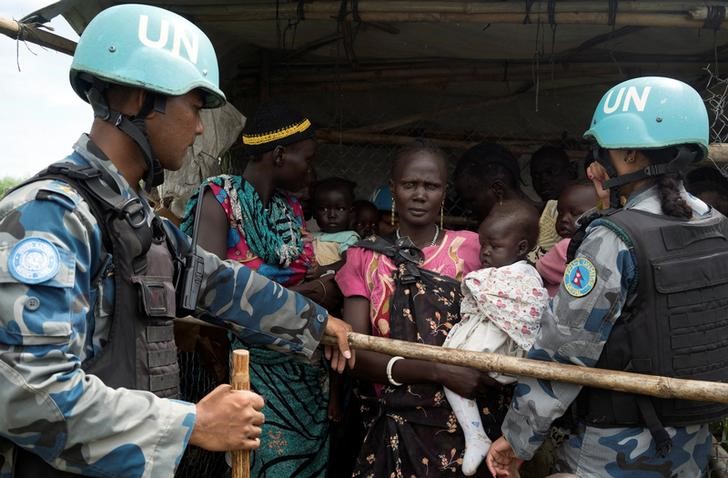By Michelle Nichols
UNITED NATIONS (Reuters) - The United Nations Security Council extended a peacekeeping mission in South Sudan on Friday until Aug. 12 as the United States warned that it had received "disturbing reports" of renewed violence in the south of the country.
The mandate for the U.N. mission was due to expire on Sunday, so the 15-member council unanimously renewed it for a brief period while they consider imposing an arms embargo on the world's newest state and sending in more troops.
U.S. Ambassador to the United Nations Samantha Power told the council before the vote that the recent violence in Juba was "horrifying but sadly not unexpected" because the country's leaders are unable to work together for their people.
"We have just received very disturbing reports of significant violence in the Equatorias (southern states) in South Sudan and all of us need to be on alert this weekend because events could spiral rapidly out of control yet again," Power said.
"Let us not be fooled that time is on our side, it is not," she said.
South Sudan descended into civil war after President Salva Kiir fired Riek Machar as vice president in 2013. The pair agreed a peace deal in August but implementation has been slow.
Heavy fighting involving tanks and helicopters erupted in South Sudan's capital Juba for several days this month between troops loyal to Kiir and those backing Machar. At least 272 people were killed before the leaders ordered a ceasefire.
Reacting to the violence in Juba, U.N. Secretary-General Ban Ki-moon called on the Security Council to fortify the peacekeeping mission. He also urged an arms embargo and sanctions for leaders and commanders blocking implementation of an August peace deal.
U.N. peacekeepers have been deployed in the country since it gained independence from Sudan in 2011. There are currently some 13,500 troops and police on the ground.
African leaders have called for the U.N. Security Council to authorise the deployment of a regional protection force to separate South Sudan's warring parties.
Machar, who was reappointed vice president this year, left Juba after the fighting and said he would only return after international troops are deployed as a buffer force to separate his forces from Kiir's.

Kiir has now replaced Machar with General Taban Deng Gai, a former chief opposition negotiator who broke ranks with Machar.